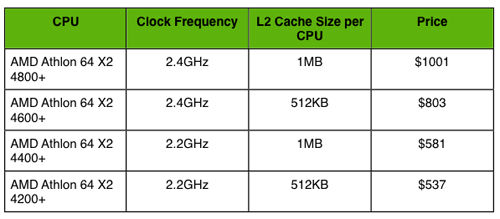AMD's dual core Opteron & Athlon 64 X2 - Server/Desktop Performance Preview
by Anand Lal Shimpi, Jason Clark & Ross Whitehead on April 21, 2005 9:25 AM EST- Posted in
- CPUs
The Lineup - Athlon 64 X2
As we mentioned earlier, the Athlon 64 X2 isn't going to be officially launched until June. While AMD is purposefully vague in their discussion of availability, it looks like their plans are for system builders and OEMs to offer Athlon 64 X2 systems in Q3 of this year and for retail availability to be in Q4 of this year.For AMD, the Athlon 64 4000+ was the last single core Athlon 64 that they will make; all model numbers after 4000+ will be dual core Athlon 64 X2s. Starting at 4200+ and going up to 4800+, the Athlon 64 X2 continues AMD's trend of basing model numbers on clock speeds and cache sizes. You can see the breakdown below:

The other major difference between AMD and Intel's dual core desktop approach is in pricing. Let's take a look at the cost per core of the Athlon 64 X2:

That being said, let's compare it to Intel's pricing:

AMD's answer to Intel's aggressive pricing is two-fold. Eventually, all of AMD's CPUs will be dual core, and thus, prices will be driven back down to single core levels. But for now, AMD feels confident enough that their single core CPUs are fast enough to compete with Intel's low clocked Pentium Ds. We put that exact thinking to the test in Part II of our Intel dual core preview and concluded that it really depends on what type of a user you are. If you tend to multitask a lot or run a lot of multithreaded applications, then a slower Intel dual core is what you need; otherwise, a faster single core AMD is your best bet.










144 Comments
View All Comments
StrangerGuy - Thursday, April 21, 2005 - link
I find it strange why AMD did not release <2.2GHz A64 X2s? Maybe due to manufacturing issues?LX - Thursday, April 21, 2005 - link
How will the bandwidth limited X2 be affected by overclocking?Chunkee - Thursday, April 21, 2005 - link
Nicely done. The price will be a factor as usual. Does the performance gain justify the cost? For the enthusiast yes, but I will wait a bit. My 754 setup with a raptor still rocks plenty enough for me. The technology improvements are great. I will always be a big AMD Fan.jC
linkgoron - Thursday, April 21, 2005 - link
not bad... but AMD should make <500$ athlon 64 X2 CPUS